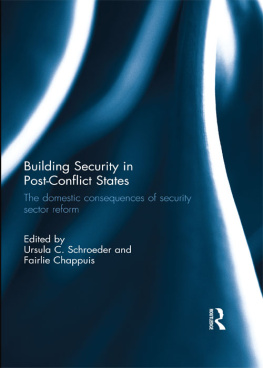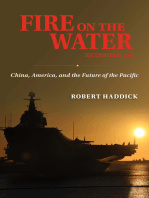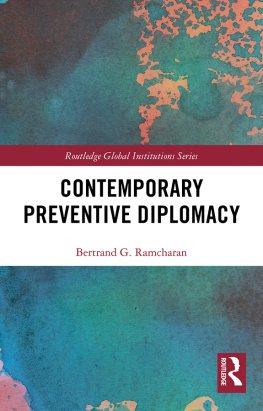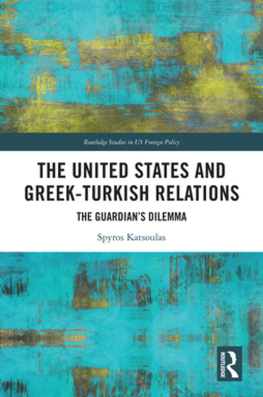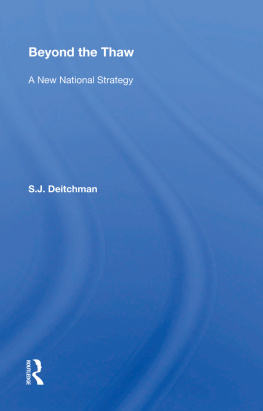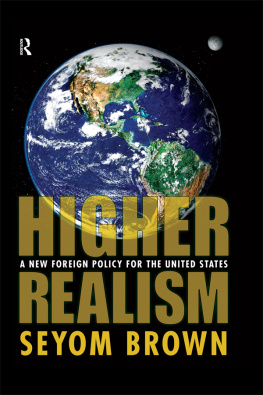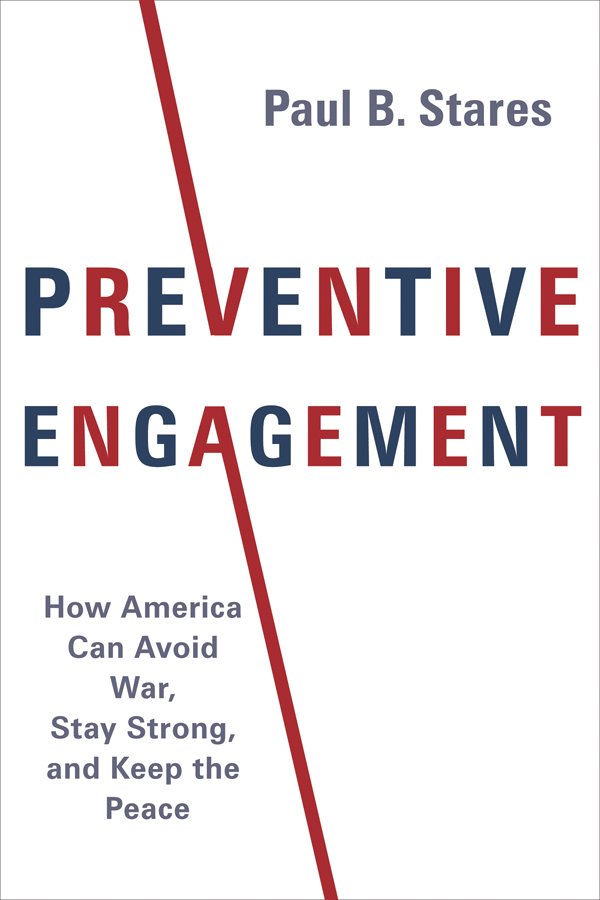Contents
Guide
Pagebreaks of the print version
PREVENTIVE ENGAGEMENT
A COUNCIL ON FOREIGN RELATIONS BOOK
The Council on Foreign Relations (CFR) is an independent, nonpartisan membership organization, think tank, and publisher dedicated to being a resource for its members, government officials, business executives, journalists, educators and students, civic and religious leaders, and other interested citizens in order to help them better understand the world and the foreign policy choices facing the United States and other countries. Founded in 1921, CFR carries out its mission by maintaining a diverse membership, with special programs to promote interest and develop expertise in the next generation of foreign policy leaders; convening meetings at its headquarters in New York and in Washington, DC, and other cities where senior government officials, members of Congress, global leaders, and prominent thinkers come together with CFR members to discuss and debate major international issues; supporting a Studies Program that fosters independent research, enabling CFR scholars to produce articles, reports, and books and hold roundtables that analyze foreign policy issues and make concrete policy recommendations; publishing Foreign Affairs , the preeminent journal on international affairs and U.S. foreign policy; sponsoring Independent Task Forces that produce reports with both findings and policy prescriptions on the most important foreign policy topics; and providing up-to-date information and analysis about world events and American foreign policy on its website, www.cfr.org.
* * *
The Council on Foreign Relations takes no institutional positions on policy issues and has no affiliation with the U.S. government. All views expressed in its publications and on its website are the sole responsibility of the author or authors.
PAUL B. STARES
PREVENTIVE ENGAGEMENT

How America Can Avoid War, Stay Strong, and Keep the Peace
Columbia University Press / New York

Columbia University Press
Publishers Since 1893
New York Chichester, West Sussex
cup.columbia.edu
Copyright 2018 Columbia University Press
All rights reserved
E-ISBN 978-0-231-54418-4
Library of Congress Cataloging-in-Publication Data
Names: Stares, Paul B., author.
Title: Preventive engagement : how America can avoid war, stay strong, and keep the peace / Paul B. Stares.
Description: New York : Columbia University Press, [2017] | Includes bibliographical references and index.
Identifiers: LCCN 2017016724 (print) | LCCN 2017037375 (ebook) | ISBN 9780231182461 (hardcover : alk. paper)
Subjects: LCSH: Conflict management. | Peace-building. | WarPrevention. | Conflict managementUnited States. | United StatesForeign relations. | United StatesMilitary policy. | National securityUnited States. | Security, International. | Conflict managementInternational cooperation
Classification: LCC JZ6368 (ebook) | LCC JZ6368 .S735 2017 (print) | DDC 355/.033573dc23
LC record available at https://lccn.loc.gov/2017016724
A Columbia University Press E-book.
CUP would be pleased to hear about your reading experience with this e-book at .
Cover design: Chang Jae Lee
For Nick, Justin, Isabel
and
Peter Stares
(19532015)

As a very important source of strength and security, cherish public credit. One method of preserving it is to use it as sparingly as possible, avoiding occasions of expense by cultivating peace, but remembering also that timely disbursements to prepare for danger frequently prevent much greater disbursements to repel it.
George Washington, Farewell Address, September 19, 1796
CONTENTS
In politics, the belief that certain facts are unalterable or certain trends irresistible commonly reflects a lack of desire or lack of interest to change or resist them.
E. H. Carr
Great powers like the United States need a sound grand strategy if they are to protect themselves and preserve the international order that they have labored hard to construct. Get the pieces of the puzzle right, and even grave threats can be turned back. Get the pieces of the puzzle wrongor worse, fail to recognize that there is a puzzleand those same threats can bring great nations to their knees.
Charles Kupchan
H istorians often mark the beginning and end of a century not by the turn of the calendar but by pivotal events that bookend the distinctive character of the period in between. Thus for some, the nineteenth century began not in 1800 but in 1789 with the French Revolution and only ended with the outbreak of the First World War in 1914. Despite its turbulent beginnings, the long nineteenth century was characterized by the ascendance of Great Britain as the predominant global power and, for the most part, no major outbreaks of international conflict. In comparison, the twentieth century is often portrayed as relatively short and certainly more violent in that it encompassed two catastrophic world wars and the dangerous Cold War confrontation between the United States and the Soviet Union that only ended with the latters formal dissolution in 1991. Over this period the United States also succeeded Britain as the preeminent global power and principal standard bearer for what is widely referred to as the liberal international ordertodays rules-based system broadly committed to the promotion of democratic values, open capitalist economies, and the peaceful resolution of disputes.
How the twenty-first century will come to be defined now seems much less certain than it did at the end of the twentieth. The general consensus then was that the world would grow progressively more peaceful and prosperous, driven in large part by the irresistible forces of globalization and broad acceptance of the liberal international order as its default operating system. Americas paramount standing in the world also seemed assured; the demise of the Soviet Union left it without a serious rival and with no new peer competitors in sight. The willingness, moreover, of successive U.S. administrations to exert Americas unmatched power and moral authority as a benign hegemon to lead coalitions of the willing in response to various challenges to international peace and securitywhether repelling Iraqi aggression in Kuwait, managing famine in the Horn of Africa, halting (for several years, at least) North Koreas nuclear weapons program, and bringing peace to the Balkans and other conflict-stricken parts of the worldlikewise bode well for a better, more orderly future.
That positive outlook, it is fair to say, no longer holds sway. Commentators now routinely talk of a world in disarray, a great unraveling, and an unmistakable sense of disintegration to describe their growing fear that the liberal international order, and Americas commitment and capacity to maintain it, are irrevocably waning. The twenty-first century is expected to become much more unstable and dangerous as a consequence. This dramatic shift in outlook can be attributed to three mutually reinforcing developments since the turn of the century.


